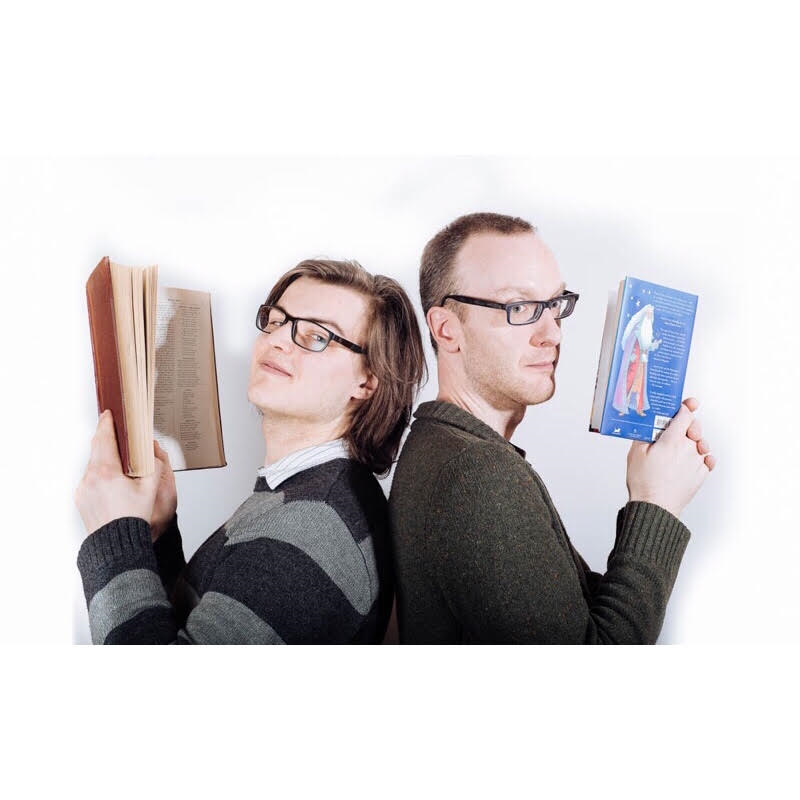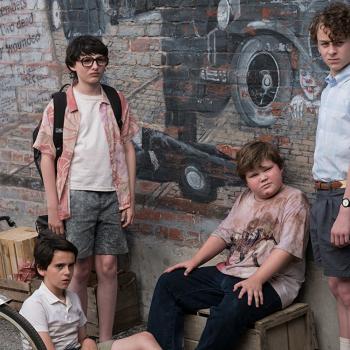I wrote about Daniel Melvill Jones and Kyle Marshall’s podcast, Assumptions, previously here. The constructive dialogue these two good friends have achieved in their discussions resonates with me as someone who also aspires to communicate respectfully with people who are different from me. In my writing here on the blog, and in discussions below posts, I’ve been privileged to get to know a number of people who come from far different perspectives, including atheists and agnostics. Some have even become off-blog friends.
I’ve been planning to interview Daniel and Kyle for a while now. This past week, we finally made it happen. This interview is fun to read but also full of insight on how we can communicate across the things that divide us. I’m grateful to both guys for sharing with my readers, and I hope you’ll check out their podcast. Two Canadians–one a pretty conservative, homeschooled Christian and the other a bisexual atheist–communicating in good faith does the heart good in this polarized age. This interview has been very lightly edited for style.
How did you meet? When you first met each other, did you make any assumptions about each other?
Kyle: I was a trainer of Daniel when he started a new job. It was strictly a trainer vs. trainee role. I found Daniel to be enthusiastic, young, and a bit overbearing. None of which has really changed. I didn’t truly find out about the deep faith Daniel had until we began watching movies together. We, along with another friend, began sharing favourite films with one another and our friendship grew from there.
Daniel: I remember first meeting Kyle almost 6 years ago. He was wearing a nerdy T-shirt that referenced a video game. (I’m pretty sure he still wears that T-shirt.) He was nice, in a Canadian sort of way, and always took the time to carefully consider my questions about the new job. When he brought in a giant antique English literature encyclopedia as a prop, I knew we had a chance of being friends. (Fun fact: Volume 1 of that encyclopedia is the book I am holding in our Season 1 banner images).
Were your assumptions proven or disproven?
Daniel: As I got to know Kyle at work, I was impressed by how curious he was. He was open to new suggestions for books and music and quick to discuss the ideas behind them.
But Kyle and I really became friends through a mutual colleague named Justin Bills. Justin, who is now a pastor, invited us bachelors into his home for movie nights. It started with Terrence Malick and then we worked our way through Richard Linklater’s Before trilogy. (You know, typical guy movies.) We would then spend the evening talking about the ways film spoke to us. When I look back on those evenings, which really were the spiritual forerunners of Assumptions, there are two things that struck me. The first was the communal aspect: we would eat together first, and Justin’s toddlers would regularly run through the living room. The second was the shared atmosphere of vulnerability. The films would summon memories that we would otherwise be shy to share. And since Justin was a pastor, including our faith in the discussion seemed natural.
Kyle: When I found out about Daniel’s faith, and especially that he was homeschooled, it made a lot of sense. Oftentimes that background means that you don’t have the greatest interpersonal skills. You get labelled as weird. I was worried that I would be shunned because of my background and sexuality, but I always felt welcomed and included both with Daniel and his family whom I’ve gotten to know over the last few years.
I don’t find it hard to be friends with people who have different viewpoints than I do, but sometimes it is hard to be really close friends when we don’t share at least the same basic assumptions about life, God, values, etc. How have you managed to overcome those barriers and become close friends–not just convivial acquaintances?
Kyle: Certainly in the first couple of years it wasn’t a topic we would really talk about. Both Daniel and I have a thirst for knowledge. I definitely also have a desire to understand other people’s points of view even if I don’t agree.
I really started to notice a few years ago that people were getting entrenched in their belief systems and either willfully being ignorant to other’s opinions, or worse completely demonizing entire groups of people. In a small way I wanted to “reach across the aisle” and seek to understand.
Daniel: I remember watching one of Kyle’s videos. We were already good friends at this point. In the video he casually confessed that he was an atheist. As a Christian whose entire world is built around the idea that there is a God who cares about us, hearing the label “atheist” almost immediately introduces a bitter taste to the mouth. And I felt that sting while watching the video. But it faded when I remembered the person who said it. It was still Kyle–the same friend who I knew and valued. It was similar experience when Kyle came out as bisexual. We were friends before there were labels.
Kyle: And that’s why “Friends Before Labels” is going to be the name of our Assumptions clothing line.
This question is to Kyle: Many of the atheists I have met seem to be left-brain thinkers. One thing that really got my attention in listening to the podcast was how much you seemed to be a right-brain thinker. This seemed to make dialogue a little easier between different viewpoints. Rather than debating, you were able to consider ideas from a creative perspective (the same goes for Daniel, of course!). Do you think you are an outlier or do you think there a lot of others like you?
Kyle: I would love to believe that I am the special snowflake, but I’m confident there are other right-brained atheists out there.
I agree with your premise for the most part. The atheists whom many are familiar with are strident in their belief and love to use the word “logic” in their debates. Even though I tend to agree with their argument, their compassion can sometimes fall away and they end up looking like jerks.
One of my personal battles is that I find myself at a crossroads between empathy and narcissism. I care a lot about people’s feelings but I also care a lot about how other people think about me. So I can’t ever jump down somebody’s throat, or become overtly passive aggressive otherwise I would end up in a deep depression for days.
Therefore, I listen to people and ask questions. I often find myself in “debates” where I’m not really arguing my stance, but more being the sounding board for others. There are too many yelling talking heads and it’s not something I’m interested in doing. I’d much rather talk openly about thoughts and feelings. Which, I know, sounds like I’m straight out of the 60s, but that’s how I approach things.
Daniel: Kyle, please remember that you are always a special snowflake in God’s eyes. But joking, aside, what Kyle has just articulated is one of the reasons I feel so free to have these kinds of conversations with him. Thank you, Kyle!













